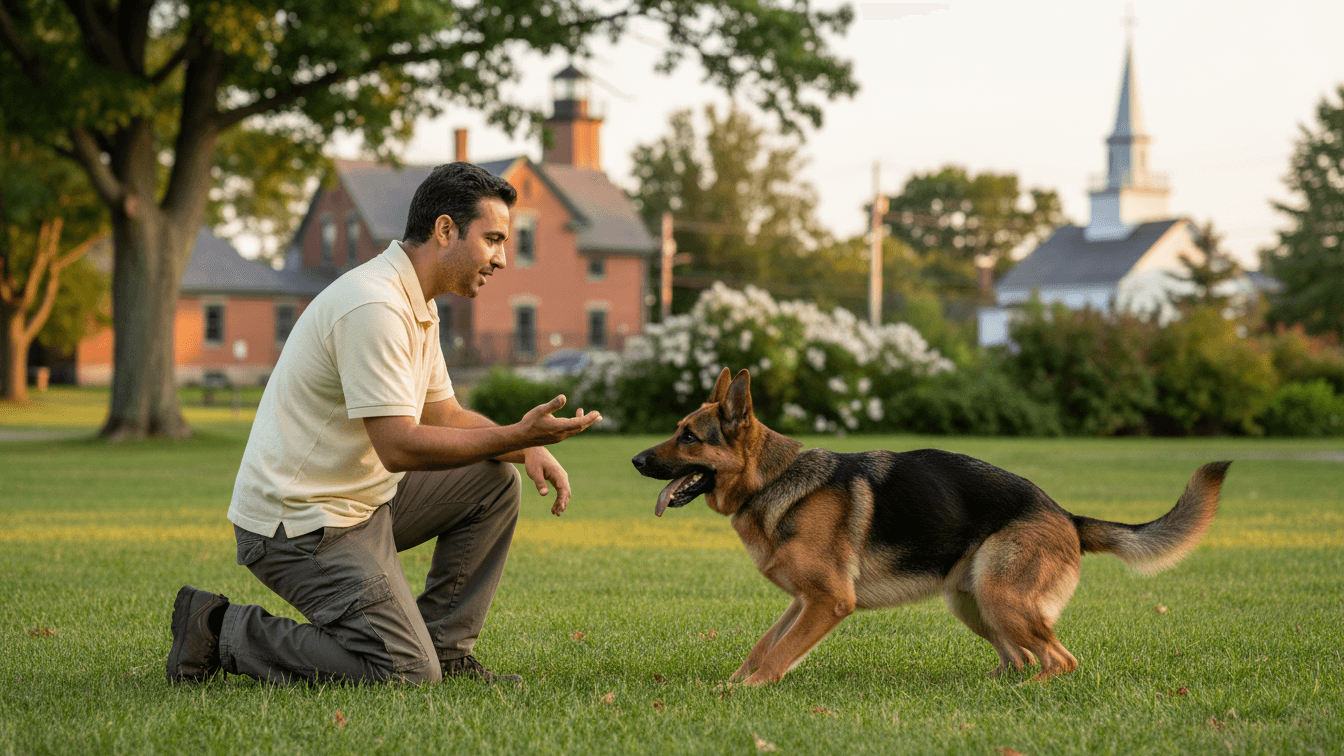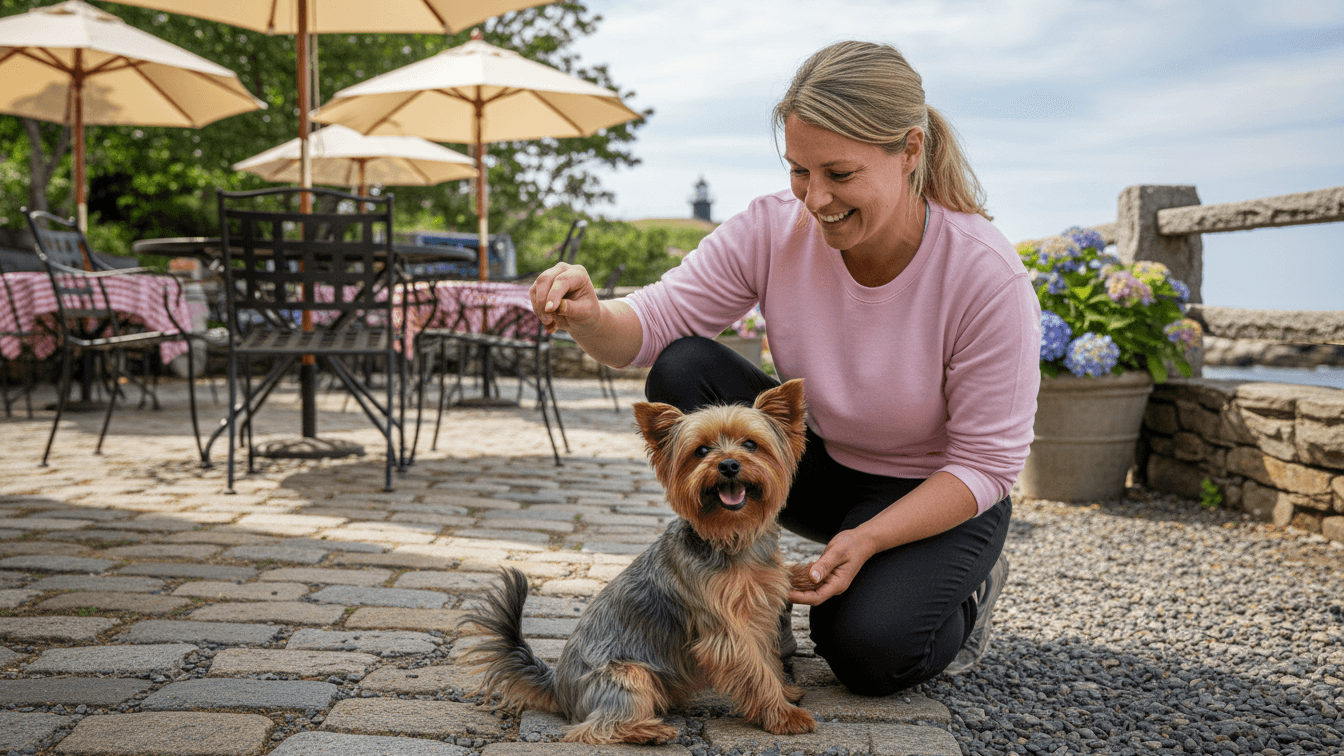Your Complete Guide to Choosing a Dog Trainer in Maine and Surrounding Areas
Living with a dog in Maine means preparing for snowy winters, muddy spring trails, and plenty of outdoor adventures. Your dog needs to handle everything from crowded coastal boardwalks to quiet forest paths, all while respecting wildlife and other people enjoying the state’s natural beauty.
Maine doesn’t require state licenses for dog trainers, but that means you’ll need to do your homework to find someone who uses humane methods and understands the unique challenges of living with dogs in this state.
How to Choose the Right Trainer
Start by looking for a professional dog trainer who uses positive reinforcement training and understands Maine’s outdoor lifestyle. Your dog should learn to walk calmly past other hikers, stay focused near wildlife, and remain calm during visits to pet-friendly shops and breweries.
Credentials offer a reliable way to compare experience and training philosophy. Common dog trainer certifications include CPDT-KA, KPA-CTP, or IAABC-CDBC for serious behavior problems. If your dog shows aggression toward people or animals, look for someone with CBCC-KA credentials or advanced behavior modification training.
In-home dog training works well for puppy training, household manners, and basic obedience. Group classes make sense once your dog can focus around distractions, which helps prepare them for busy summer tourist areas and crowded trails.
Consider whether you need help with specific challenges like reactivity toward moose or deer, anxiety during thunderstorms, or recall skills before hiking off-leash on approved trails.
Common Dog Training Methods Explained

Reward-based methods create lasting behavior changes while building the trust you need when your dog encounters unexpected wildlife or challenging weather conditions. These methods also help you meet Maine’s requirements for keeping dogs under control in public spaces.
Basic obedience covers sit, down, stay, recall, and leash training so your dog can handle busy downtown areas, farmers markets, and beach visits without pulling or jumping on tourists. These skills become essential when navigating crowded ferry docks or outdoor festivals.
Puppy classes focus on socialization, potty training, bite inhibition, and early leash skills. Starting young prevents bad habits and helps your puppy grow comfortable with the sights and sounds of coastal towns, working harbors, and seasonal crowds.
Behavior modification addresses fear, reactivity, separation anxiety, or resource guarding through careful desensitization and counterconditioning. For complex cases, ask whether your trainer collaborates with veterinary behaviorists.
Private lessons and in-home sessions let you customize training around your daily routines and specific environmental challenges. Day training can speed up progress when you’re short on time but still want professional guidance.
Dog training classes help your dog practice good manners around other dogs and people. The best programs screen participants carefully, provide plenty of space, and teach calm behavior rather than overexcitement.
Service dog training and therapy dog training require structured programs, public-access skills, and clear benchmarks. Make sure any trainer offering these specialized services has documented experience in these areas.
Avoid trainers who rely on fear, intimidation, or physical corrections. Humane training methods are safer, more effective long-term, and better suited for building a confident dog who can handle Maine’s unpredictable conditions.
Average Cost of Dog Training in Maine (Updated for 2025)
Prices across Maine vary based on location, trainer experience, and whether you’re in a rural area or closer to Portland, Bangor, or the coast. Here’s what most dog owners are paying in 2025.
| Service Type | Average Cost (Maine) |
|---|---|
| Puppy classes (4-6 weeks) | $140-$250 total |
| Group obedience classes (4-6 weeks) | $150-$275 total |
| Private lessons (60-90 min) | $100-$175 per session |
| In-home coaching packages (4-6 visits) | $400-$850 total |
| Day training (trainer works your dog) | $400-$900 per week |
| Behavior consult for reactivity/anxiety | $140-$230 initial session |
| Board and train (2-4 weeks) | $1,800-$4,200 total |
Expect higher rates in the Greater Portland area and along the coast, with slightly lower prices in rural counties. Many trainers charge travel fees for longer distances, especially in central and northern Maine.
Make sure you understand what’s included in each package, how progress gets tracked, and whether the trainer offers a free consultation before you commit.
Questions to Ask a Potential Dog Trainer
- What training methods do you use, and how do you keep training sessions positive and low-stress?
- What credentials do you hold, like CPDT-KSA or KPA-CTP, and do you pursue continuing education?
- How will you customize the training program for my dog’s specific needs and our Maine lifestyle?
- Do you offer in-home visits, group classes, or day training, and which approach fits my goals best?
- How will we measure my dog’s progress and know when to increase distractions?
- What are the total costs, including travel fees, and what’s your cancellation policy?
- Do you carry liability insurance, and can you provide proof?
- For behavior problems, will you work with my veterinarian or a veterinary behaviorist if needed?
- What should I practice between sessions to help my dog keep improving?
- Have you worked with dogs who need to learn wildlife awareness or winter safety skills?
Local Maine Rules and Considerations
Maine takes pet laws seriously, especially when it comes to public safety, wildlife protection, and rabies prevention. Understanding these rules helps you choose dog training services that prepare your dog for real-world expectations.
State law requires dogs to be under control at all times in public areas. This typically means on-leash unless you’re in a designated off-leash area or have explicit permission from the property owner. Violations can result in fines and liability if your dog causes damage or injury.
Maine’s leash laws become particularly important during wildlife breeding seasons. Allowing dogs to chase or harass wildlife can result in serious penalties, and training your dog to ignore deer, moose, and other animals protects both your pet and local ecosystems.
Rabies vaccination is mandatory for all dogs in Maine, with boosters required according to the vaccine manufacturer’s guidelines. You can find current requirements and county-specific clinics through the Maine CDC Rabies Program.
Excessive barking falls under local noise ordinances, which vary by town. Work with your trainer on alert barking and separation anxiety before neighbors file complaints with animal control.
Maine doesn’t require state licensing for dog trainers, but trainers who board dogs as part of their dog training services may need to meet kennel licensing requirements through the Maine Department of Agriculture, Conservation and Forestry Animal Welfare Program.
If your trainer wants to use municipal parks or beaches for training sessions, they may need commercial use permits and proof of liability insurance. Ask about this during your initial consultation.
Local Maine Resources for Dog Owners
These locations give you safe spaces to practice recalls, work on socialization, and provide healthy enrichment for your dog. Always follow posted rules and respect seasonal closures.
- Winslow Dog Park in Winslow offers fenced areas for off-leash practice and controlled socialization with other dogs.
- Quarry Run Dog Park in Portland provides separate areas for small and large dogs, making it easier to practice calm greetings and recall skills.
- Acadia National Park welcomes leashed dogs on most carriage roads and several trails, offering excellent opportunities to build focus around wildlife, hikers, and cyclists. Check current regulations before visiting.
- Many Maine towns maintain beach access for leashed dogs during off-season months, perfect for leash training and confidence-building around water and sand.

FAQs
How much does in-home dog training cost?
Most Maine trainers charge $100-$175 per in-home visit, with discounts available when you purchase multi-session packages. Behavior modification for issues like reactivity or aggression typically starts at the higher end of that range.
Is in-home dog training worth it?
Yes, because you’re addressing problems exactly where they happen. Your trainer can work on door manners, jumping on guests, counter-surfing, and window reactivity right in your home, then step outside to practice leash skills on your actual walking routes.
Can you pay someone to house train your dog?
Absolutely. Many expert dog trainers offer puppy programs that include potty training, crate routines, and daily schedules customized for Maine’s weather challenges. Day training can speed up the process while teaching you how to maintain progress.
What is the 3-3-3 rule for dog training?
This timeline helps set realistic expectations for newly adopted dogs: expect about 3 days for your dog to decompress, 3 weeks to learn your routines, and 3 months to feel completely settled. Good training programs work with this natural adjustment period rather than against it.
How long will it take to reach my training goals?
Most puppies and friendly adult dogs show solid progress within 4-8 weeks if you practice daily. Fear, reactivity, or aggressive dog training typically requires several months of careful behavior modification with gradual increases in difficulty.
What should I bring to group classes?
Pack a flat collar or harness, 6-foot leash, high-value treats, water, and current vaccination records if your trainer requests them. Leave retractable leashes at home for safety reasons.
What’s the leash law in Maine?
State law requires dogs to be under control at all times in public spaces. Most municipalities interpret this as on-leash unless you’re in a designated off-leash area. Violations can result in fines starting at $50 and increase for repeat offenses.
Do I need a dog license in Maine?
Yes. Most Maine municipalities require annual dog licenses, with fees varying by town and whether your dog is spayed or neutered. Licenses typically cost $6-$11 for altered dogs and higher for intact dogs. Contact your town office for specific requirements.
What shots does my dog need in Maine?
Rabies vaccination is required by state law. Your veterinarian may also recommend distemper-parvo, bordetella, and leptospirosis based on your dog’s lifestyle and exposure risks. Check current guidelines through the Maine CDC Rabies Program.
Are dog trainers required to be licensed in Maine?
No special licenses exist for dog trainers in Maine. Trainers follow normal business regulations, but if they offer board and train programs or keep dogs overnight, their facility may need to meet kennel licensing requirements under the state’s Animal Welfare Program.
Where can I practice off-leash recall?
Use fenced dog parks like Quarry Run in Portland or Winslow Dog Park to keep things safe and legal. Private training facilities may also offer secure areas for recall practice. Avoid practicing off-leash in areas with wildlife or where local ordinances prohibit it.
Which dog parks allow training around Maine?
Quarry Run Dog Park in Portland and Winslow Dog Park both allow off-leash play within their fenced areas. Many Maine towns maintain smaller dog parks, though rules about professional training vary. Check with your local parks department before using these spaces for commercial training purposes.
What beaches or trails allow dogs for training?
Acadia National Park permits leashed dogs on most carriage roads and select trails, making it perfect for building focus around heavy foot traffic and wildlife. Many coastal towns allow leashed dogs on beaches during off-season months, typically October through May. Check local regulations before visiting, as rules change seasonally.
How do I help my dog handle Maine winters?
Work with your trainer on paw care, including getting your dog comfortable with booties and paw wax. Practice recall and leash training indoors during harsh weather, and gradually build your dog’s tolerance for cold temperatures. Some dogs need winter coats, especially short-haired breeds or senior dogs.
What should I do if my dog chases wildlife?
This is a serious safety and legal issue in Maine. Work with a certified dog trainer who specializes in impulse control and wildlife desensitization. Practice strong recall skills in controlled environments before testing them near areas with deer, moose, or other animals. Keep your dog leashed in wildlife areas until you have rock-solid obedience.
Can my well-behaved dog be off-leash on hiking trails?
Only if local regulations specifically permit it and your dog has excellent recall under all circumstances. Most Maine trails require leashes to protect wildlife and other hikers. Even with a top dog who responds perfectly at home, trails present unpredictable challenges that can override training.
The right combination of humane methods, consistent practice, and realistic expectations will help your dog become a confident companion ready to handle everything Maine has to offer. Whether you need help with basic manners or complex behavior problems, choosing a qualified trainer who understands the state’s unique challenges makes all the difference for you and your dog.
